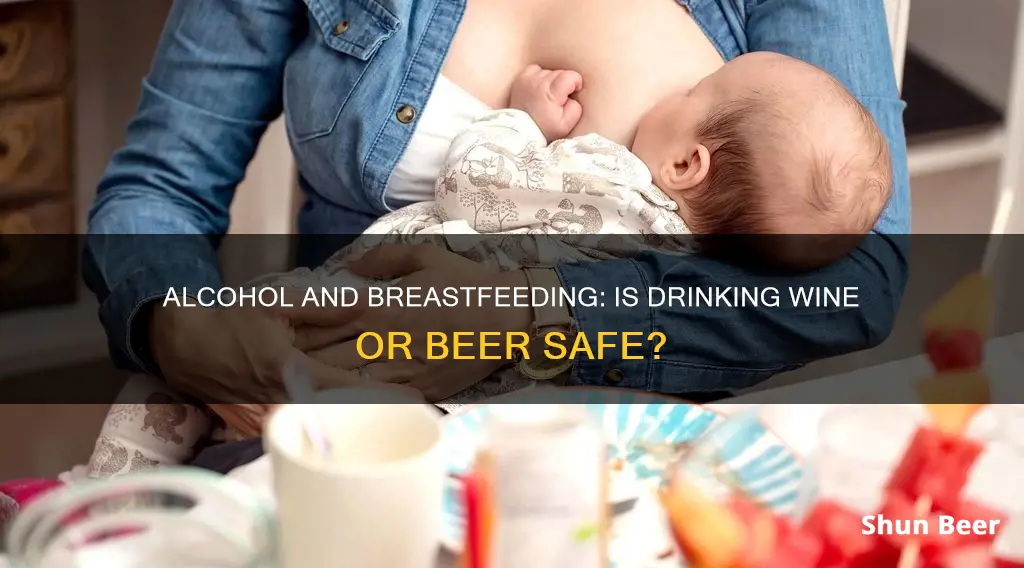
It is not recommended to consume alcohol while breastfeeding. However, having an occasional drink is unlikely to harm your baby, especially if you wait for a couple of hours after drinking before breastfeeding. The alcohol level in breast milk is the same as the alcohol level in the mother's bloodstream, so as the mother's alcohol blood level falls, the level of alcohol in her breast milk will also decrease. It takes about two hours for the average adult to metabolize one drink.
| Characteristics | Values |
|---|---|
| Can I drink alcohol while breastfeeding? | It is not recommended to drink alcohol while breastfeeding. However, an occasional drink is unlikely to harm your baby, especially if you wait at least 2 hours after drinking before breastfeeding. |
| How much alcohol can I drink while breastfeeding? | Moderate alcohol consumption, or up to one standard drink per day, is generally considered safe for breastfeeding mothers. One standard drink is typically defined as 12 oz. of 5% ABV beer, 8 oz. of 7% ABV malt liquor, 5 oz. of 12% ABV wine, or 1.5 oz. of 40% ABV liquor. |
| How long should I wait after drinking alcohol before breastfeeding? | It is recommended to wait at least 2 hours after drinking alcohol before breastfeeding. The alcohol level in breast milk decreases as the alcohol level in the mother's bloodstream falls over time. |
| Does alcohol affect breast milk production? | Regular alcohol consumption can negatively affect breast milk production and the let-down reflex, resulting in a decreased milk supply. |
| Does alcohol in breast milk harm the baby? | Exposure to alcohol above moderate levels through breast milk can interfere with the milk ejection reflex and may lead to decreased milk production over time. It can also affect the infant's development, growth, and sleep patterns. |
What You'll Learn

How long after drinking can I breastfeed?
It is recommended that breastfeeding mothers wait at least two hours after drinking one alcoholic drink before breastfeeding their baby. This is because it takes the body about one to three hours to metabolise the alcohol in the blood, and alcohol passes into breast milk in much the same way. The more you drink, the longer alcohol will be present in your blood and milk.
For example, alcohol from a single drink stays in your breast milk for about two to three hours; alcohol from two drinks will be present for about four to five hours; alcohol from three drinks will be present for about six to eight hours.
If you have consumed a large amount of alcohol, you may need to wait longer than two hours before breastfeeding. If you have had three drinks, for example, it is recommended that you wait six to eight hours before breastfeeding.
If your baby needs to be fed before the two hours are up, you can use previously expressed milk. However, "pumping and dumping" will not remove the alcohol from your breast milk. The amount of alcohol in your milk will drop as the amount of alcohol in your blood drops.
Drinking Beer on a Pier: What's the Legal Ruling?
You may want to see also

How much alcohol can I consume while breastfeeding?
It is recommended that breastfeeding mothers abstain from drinking alcohol completely or limit their alcohol consumption. If you do choose to drink, it is important to wait at least two hours after drinking before nursing or pumping, as alcohol can pass into your breast milk and may have negative effects on your baby.
The amount of time it takes for alcohol to leave your system and breast milk depends on several factors, including the amount and speed of alcohol consumption, whether it was consumed with food, your weight, and how quickly your body breaks down alcohol. On average, it takes about two to three hours for alcohol from one drink to leave your breast milk, four to five hours for alcohol from two drinks, and six to eight hours for alcohol from three drinks.
To ensure the safety of your baby, it is recommended to have no more than one drink per day and to wait at least two hours after drinking before breastfeeding or pumping. This allows the alcohol level in your breast milk to decrease, reducing potential risks to your baby's development, growth, and sleep patterns.
Excessive alcohol consumption can lead to a decrease in milk production and can affect your let-down reflex, resulting in reduced milk intake for your baby. It is also important to note that drinking alcohol can impair your judgment and ability to care for your baby safely. Therefore, if you drink more than one drink, it is recommended to have a sober caregiver for your baby.
In summary, while occasional alcohol consumption is generally considered safe for breastfeeding mothers, it is important to drink in moderation, wait at least two hours after drinking before nursing or pumping, and prioritize the safety and well-being of your baby.
Beer and Ulcers: Is it Safe to Drink?
You may want to see also

Does the type of alcohol matter?
It is important to note that not drinking alcohol is the safest option for breastfeeding mothers. However, having an occasional drink is unlikely to harm the baby, especially if the mother waits for at least 2 hours after drinking before breastfeeding. This is because it takes about 2 hours for the average adult to metabolize one drink, and the alcohol level in breast milk is essentially the same as the alcohol level in the mother's bloodstream.
The amount of time it takes for alcohol to leave the body varies from person to person and depends on factors such as weight, the amount of alcohol consumed, the speed of consumption, whether it is consumed with food, and how quickly the body breaks down alcohol. The more drinks consumed, the longer it takes for the alcohol to clear the system.
Different types of alcoholic drinks contain varying amounts of alcohol. For example, a standard drink is typically defined as 12 ounces of 5% ABV beer (one can), 8 ounces of 7% ABV malt liquor, 5 ounces of 12% ABV wine (one glass), or 1.5 ounces of 40% ABV liquor (one shot). However, many common drinks contain much more alcohol than this. For instance, 12 ounces of 9% ABV beer contains nearly the same amount of alcohol as two standard drinks.
Therefore, it is important for breastfeeding mothers to pay careful attention to the choices they make and consider the alcohol content of what they are drinking. While one 12-ounce glass of 5% ABV beer is considered one drink, having the same amount of a 9% ABV beer is like having two drinks.
In summary, while the type of alcohol does matter in terms of its alcohol content and how it affects the body, it is more important for breastfeeding mothers to consider the amount of alcohol consumed and to allow sufficient time for it to metabolize before breastfeeding.
Pouring Beer: Understanding the Inner Workings of a Faucet
You may want to see also

What are the risks of drinking alcohol while breastfeeding?
While an occasional drink is unlikely to harm your baby, regular drinking above the recommended limits can be harmful to both you and your baby. Here are some of the risks associated with drinking alcohol while breastfeeding:
Impact on the Baby's Health and Development
Drinking alcohol can affect your baby's health and development in several ways. Firstly, alcohol passes into your breast milk and can be consumed by your baby during feeding. While small amounts are not known to be harmful, excessive alcohol consumption can lead to developmental, growth, and sleep issues in the baby. Research has shown that even small to moderate amounts of alcohol can disrupt a baby's sleep patterns. Additionally, heavy drinking may cause sedation, fluid retention, and hormonal imbalances in the baby. Furthermore, studies suggest that repeated exposure to alcohol in breast milk could potentially cause long-term harm to the baby's development.
Decreased Milk Supply
Alcohol consumption can negatively impact your milk supply. It can interfere with hormones such as oxytocin and prolactin, which are crucial for milk production and the let-down reflex. Regular drinking may lead to a decrease in milk supply and shorter breastfeeding duration.
Impaired Caregiving Ability
Alcohol consumption can impair your judgment and ability to care for your baby safely. It can slow down your reaction time and make you less aware of your baby's needs. If you plan to drink, it is recommended to have a sober adult caregiver available to take care of the baby.
Risk of Sudden Infant Death Syndrome (SIDS)
Co-sleeping with your baby after drinking alcohol is strongly associated with an increased risk of SIDS. It is important to avoid bed-sharing or sofa-sharing if you have consumed alcohol.
Beer Drinking in Abu Dhabi: What's the Deal?
You may want to see also

What are the alternatives to breastfeeding after drinking?
It is important to note that alcohol can pass into your breast milk and then into your baby when you feed them. While an occasional drink is unlikely to harm your baby, especially if you wait for at least 2 hours after drinking before breastfeeding, regularly drinking above the recommended limits can be harmful to both you and your baby.
If you are planning on drinking and are unable to wait for 2 hours before breastfeeding, here are some alternatives to breastfeeding:
- Breast milk in a bottle: You can pump your breast milk and then bottle-feed it to your baby. This method is recommended by paediatricians and lactation consultants as the next best choice to direct breastfeeding.
- Breast milk sharing: Some lactating women donate breast milk to milk banks, which can be accessed with a doctor's prescription. However, it is important to ensure that the milk is obtained from a reputable source with strict safety and processing protocols to minimise the risk of contamination or infection.
- Commercial baby formula: There are various types of commercially available baby formulas, including cow-milk protein, soy-based, and hydrolyzed formulas. These formulas are designed to meet your baby's nutritional needs and are regulated to ensure safety.
- Non-alcoholic beer: If you are looking for an alternative drink that may increase your milk supply, non-alcoholic beer might be an option. While regular beer contains alcohol, which can decrease milk production, non-alcoholic beer contains a polysaccharide that may increase milk supply.
Drinking Alcohol-Free Beer: Is It Safe to Drive in the UK?
You may want to see also
Frequently asked questions
Yes, but only in moderation. One alcoholic drink per day is considered safe, but you should wait for at least 2 hours after drinking before breastfeeding your baby.
It takes around 2 hours for the average adult to metabolize one alcoholic drink. This time may vary depending on factors such as weight, the amount of alcohol consumed, and whether it was consumed with food.
No, it is not recommended to co-sleep with your baby if you have been drinking alcohol, even in moderation. Doing so increases the risk of sudden infant death syndrome (SIDS).







